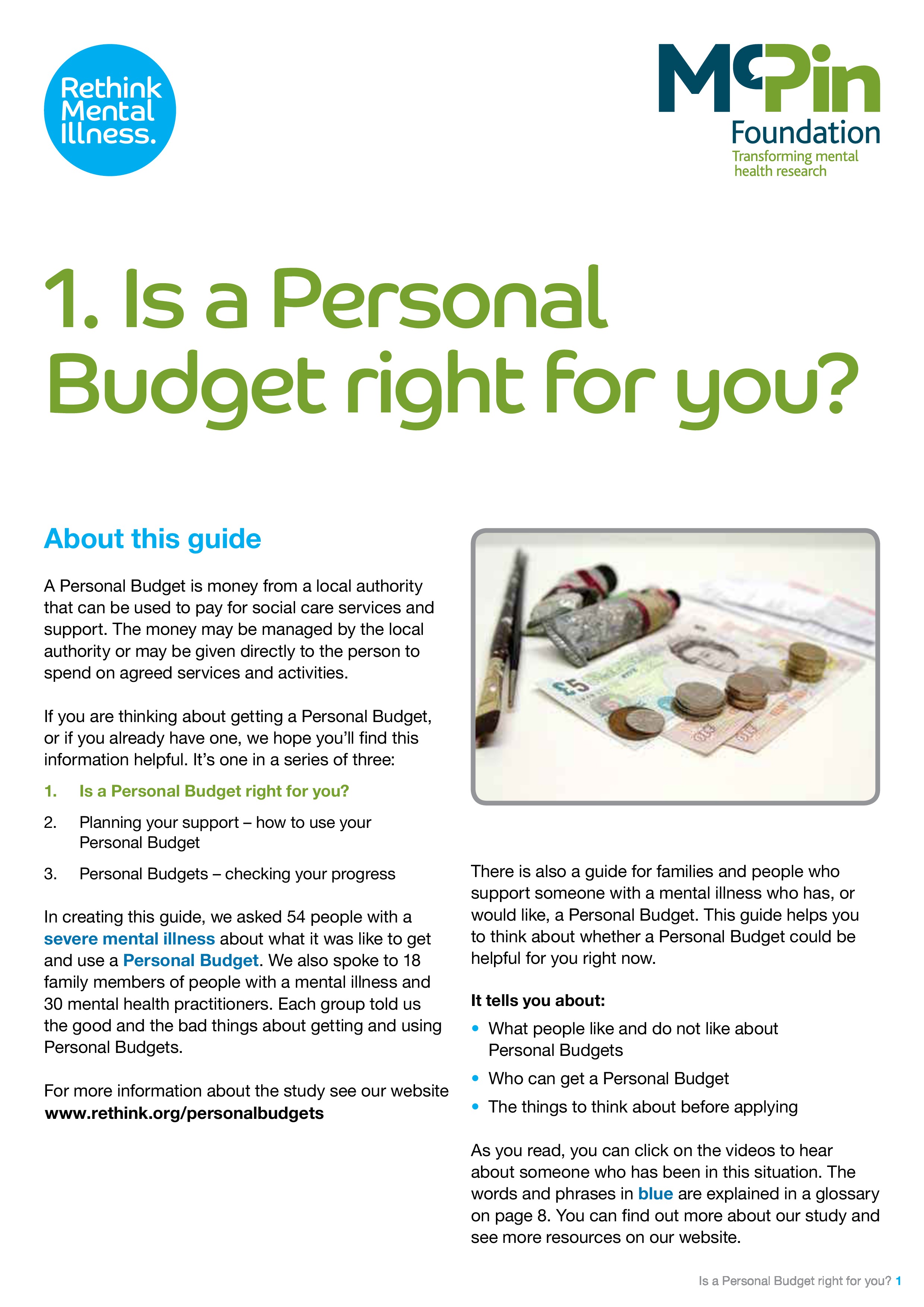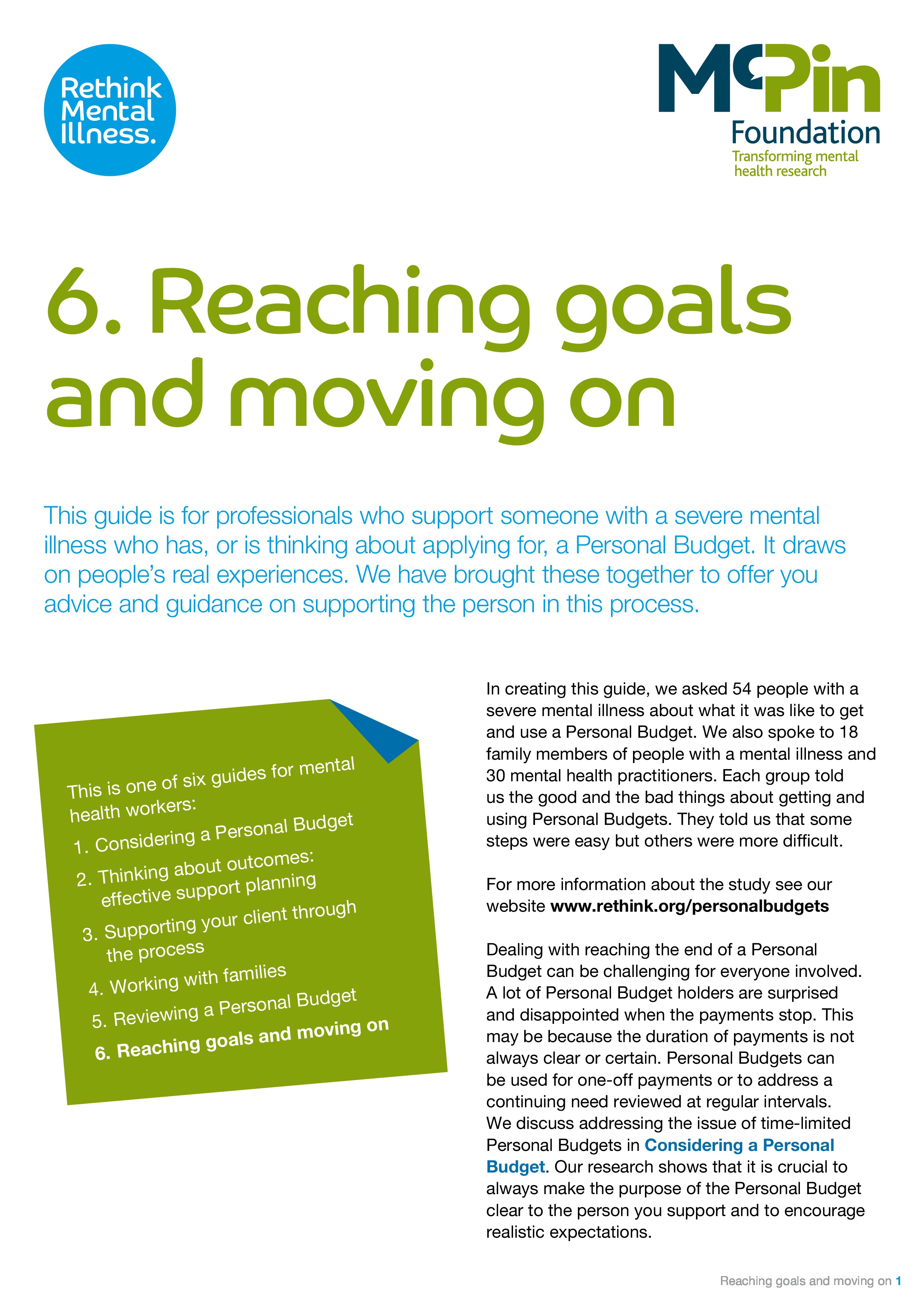Sarah Hamilton, Research Manager at The McPin Foundation, introduces new guides available for practitioners, service users and families getting to grips with Personal Budgets and Direct Payments for people with severe mental illness.
The transformation of social care services and the shift towards personalisation over the last few years has presented many, well discussed challenges for local authorities, social care professionals and service users and their families. In mental health, however, there are specific challenges that need to be addressed. Take up of personal budgets in mental health lags behind other disability groups. In 2012-13, 8.6% of people with mental health problems received self-directed support compared to 27.3% of people with a physical disability and 28.4% of people with a learning disability (HSCIC, 2013).
 Our three year research project explored the challenges of introducing personal budgets for severe mental illness in four local authorities. We identified barriers to implementing personalisation that meant that some areas were still struggling to offer personal budgets at all. Chief among these is the difficulty posed by the integration of health and social care, such that personal budgets became the responsibility of both – or sometimes seemingly of neither (Larsen et al, 2013).
Our three year research project explored the challenges of introducing personal budgets for severe mental illness in four local authorities. We identified barriers to implementing personalisation that meant that some areas were still struggling to offer personal budgets at all. Chief among these is the difficulty posed by the integration of health and social care, such that personal budgets became the responsibility of both – or sometimes seemingly of neither (Larsen et al, 2013).
Where personal budgets are available, however, other difficulties arise in practice. In the PEOPLE Study we interviewed over 50 people who received, or were applying for, a personal budget to support their mental health, as well as care co-ordinators and families. We found, even among these service users, that there was little awareness of personal budgets, what they are for and how they can be used. The shifting policies and budget cuts of local authorities made it hard for practitioners and service users to get to grips with what was possible. Among many practitioners, patience with these problems had already run out, and we heard how many no longer saw any value in starting a process that was liable to disappoint.
Despite the challenges, however, we also saw how personal budgets and direct payments, when used creatively, could transform lives and give people the determination and the control to manage their lives in the way they wanted. The learning from this research showed how the experience of getting and using personal budgets could be improved, and how practitioners, service users and families can, between them, secure the type of support that makes the biggest difference.
 From this research we have produced a series of guides for people with a mental illness, their families, and mental health staff. The guides tell it as it was for the people who shared their stories with us. They point out challenges and offer solutions, and provide examples of what can change for people when it works. They include recorded stories using people’s own words to describe what getting a personal budget was like for them. The guides are freely available to download, use and distribute from Rethink Mental Illness.
From this research we have produced a series of guides for people with a mental illness, their families, and mental health staff. The guides tell it as it was for the people who shared their stories with us. They point out challenges and offer solutions, and provide examples of what can change for people when it works. They include recorded stories using people’s own words to describe what getting a personal budget was like for them. The guides are freely available to download, use and distribute from Rethink Mental Illness.
The research project which led to the guides was delivered in a partnership between The McPin Foundation and Rethink Mental Illness, with support from Jill Manthorpe of the Social Care Workforce Research Unit (SCWRU), King’s College London, and Jerry Tew of the University of Birmingham. It was funded by the Big Lottery.
Sarah Hamilton is based at The McPin Foundation in London. You can contact her on sarahhamilton@mcpin.org, or visit the Foundation’s website to see more of its work.
@McPinFoundation | @Rethink_ | @scwru
References
Adult Social Care Statistics team, Health & Social Care Information Centre, Measures from the Adult Social Care Outcomes Framework, England 2012-13, Provisional Release, 10 July, 2013.
Larsen, J., Ainsworth, E., Harrop, C., Patterson, S., Hamilton, S., Szymczynska, P. Tew, J., Manthorpe, J. & Pinfold, V. (2013). Implementing personalisation for people with mental health problems: A comparative case study of four local authorities in England. Journal of Mental Health, 22(2): 174-182.